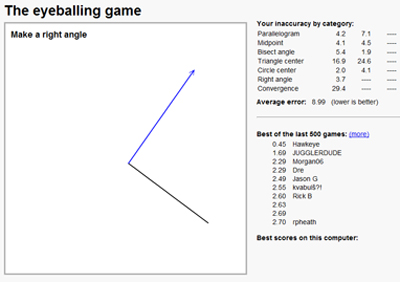
There are three things, as far as I’m concerned, that make this experience a fun one. First, the game challenges skills I don’t often have the chance to explore. Visual perception may be useful in some professions, but it’s never been a particular strength of mine, and I certainly don’t use it much from day to day. It was very satisfying for me to feel my brain stretch as I got better at the exercises!
That brings me to the second point that made this game successful: the game gives you feedback on how you did. After each of the seven mini-games, it shows how many “units” you were off by, and actually shows you what the correct answer looks like. This helps you get better over time, both because you can consciously try to understand why a particular answer was off and because you unconsciously get better at seeing. For example, I developed a conscious strategy for the right-angle game, namely turning my head until the base of the angle looked horizontal; I also found myself more able to perceive when the blue line was very slightly off the perpendicular. Because you get to play each game three times per round, you can actually watch yourself improve!
That brings me to the third thing that’s successful about this game: that the game tracks your progress over time. Not only do you get to see your three scores per game per round, but the game tracks your best score on a particular computer, and it lets you compare yourself against the best recent players. Even the simple guideline of “lower is better” helps shape your relationship to these games. When I’d make a mistake and be off by, say, 30.9 units, I’d find myself cringing at the thought of what it would do to my average.
There are lessons for Advance here. The bad news is that this game has only made me more sure that we need to get our feedback to players just right – and I’m not sure we’ve managed it yet. But on the bright side, if this game can be motivating and engaging by introducing scoring and feedback, so can ours. While we’ve made some early prototypes that show our basic gameplay is fun, we’re relying heavily on our scoring system to get players to think carefully about bias. This game reassures me that getting the numbers to be as big or as small as possible can be highly motivating, at least for players like me.